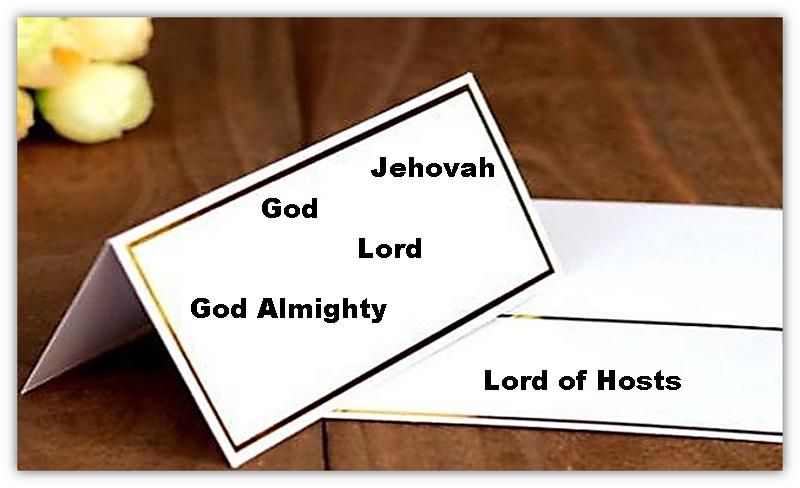God's Names Doctrinal Christianity
God's Names Doctrinal Christianity

“God is a Spirit, infinite, eternal, and unchangeable, in His being, wisdom, power, holiness, justice, goodness, and truth” (Westminster Shorter Catechism, Q. 4). Consequently, He is incomprehensible; man is incapable of thinking about all that God is. So any self-revelation of God is a gracious act whereby God condescends to man’s limited understanding.
God’s names or titles are one of the key ways that He has revealed Himself. These names are more than just labels of identification; they are propositional descriptions of some aspect of His infinite Persons. Consequently, they are not used haphazardly and should not be passed over lightly in the reading of Scripture. The name or title used in any context is part of the message.
There are generally three categories of God’s names:
- propositional, expressing some fact of the divine Being, such as God Most High (Gen. 14:18-22) and Everlasting God (Gen. 21:33);
- historical, commemorating some encounter with God (such as Jehovah-jireh, “the Lord will provide,” Gen. 22:14; see also Gen. 16:13; Ex. 17:15); and
- personal, declaring some individual experience (the God of Abraham, the Fear of Isaac, etc.).
Here is a brief explanation of five of the most common propositional names in the Old Testament:
Jehovah⤒🔗
This is God’s personal name, especially linked to His covenant grace and mercy. Derived from the verb “I am” (explained at the burning bush in Exodus 3), the name declares God’s self-sufficient independency, eternity, and sovereignty. Yet amazingly, Jehovah is the principal name of God used in contexts of salvation. Although God is infinitely independent of anything outside of Himself, He is willing to have intimate fellowship with man, particularly through the covenant of grace. Jehovah, therefore, is often referred to as God’s “covenant name.” In the KJV, it is always completely in capital letters as LORD or occasionally as GOD.
God←⤒🔗
This is the most general term for deity. At times the Hebrew word is singular (El), at other times plural (Elohim). Both forms stress God’s greatness. He is all-powerful; He possesses all authority; He is able to do whatever He pleases. This title magnifies God’s transcendence; He is exalted far above all creation, including man. The plural form is a plural of majesty or excellence that highlights His power and greatness even more. Significantly, this is His first self-revelation: “in the beginning God” (Gen. 1:1; see Ps. 19:1). He is the Creator.
Lord←⤒🔗
The title Adonai describes God as the supreme Owner and Master of everything. Everything belongs to Him, and He governs everything according to His own purpose for His own glory. It declares His absolute Sovereignty or Kingship. Earthly kings come and go, but the heavenly King reigns supreme forever (Isa. 6:1). All men and every nation, whether they acknowledge Him or not, are subject to His authority and are accountable to Him. He is the Sovereign over all the earth; all will bow before Him (2 Kings 7:6; Amos 1:8; Dan. 1:2; Ps. 110: 5). In the KJV, this title occurs as Lord to distinguish it from Jehovah LORD.

God Almighty←⤒🔗
Although this title occurs most frequently in the patriarchal period, especially in Job, it is not limited to that period. The Hebrew is El Shaddai. Opinions differ regarding the translation, but most likely it means the “God who is sufficient.” He is ably sufficient to keep every word of His promises even when the fulfillment seems impossible. Nothing is too hard for El Shaddai. He is the master of the supernatural and can overpower the course of nature to perform His will. So even though the prospect of a great nation from Abraham seemed unlikely, behind the promise was El Shaddai and thus the promise was certain (Gen. 17:1; 35:11-12).
Lord of Hosts←⤒🔗
This is “Jehovah of armies,” a military expression identifying God as the “Commander,” who has all authority and infinite rank to order His troops to accomplish His will. This title occurs most frequently during the period of the monarchy. Depending on the context, the army may refer to Israel, the angels, the heavenly bodies (stars and planets), or even all of creation. The point is clear that God has the power, authority, and resources at His command to do and to achieve all of His plans and purposes. No matter how great the promise or how serious the threat, the LORD of Hosts will command and it will be done.
Pray God that His names may be indelibly impressed upon your mind, your heart, and your daily experience as God’s great gifts of self-revelation to you.

Add new comment